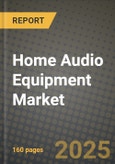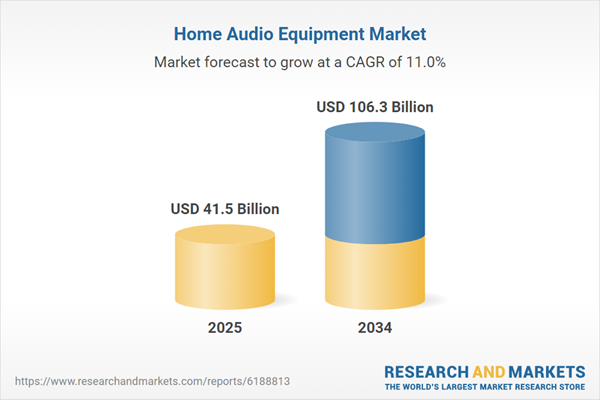The Home Audio Equipment market has evolved into a dynamic and competitive landscape, driven by increasing consumer demand for immersive sound experiences and smart connectivity features. From traditional stereo systems to advanced wireless audio solutions, the market now includes soundbars, smart speakers, home theater systems, and multi-room audio setups. Consumers are increasingly investing in premium audio systems for personal entertainment, fueled by the rising popularity of streaming services and high-definition content. Technological advancements such as Dolby Atmos, voice assistant integration, and Bluetooth 5.0 have further enhanced user experience and convenience. Moreover, changing lifestyles and remote work trends have reinforced the importance of home entertainment, driving sustained interest in high-quality audio equipment. Manufacturers are continuously innovating to meet evolving consumer preferences, offering compact, stylish, and multifunctional devices that align with modern interiors while delivering exceptional audio performance.
The Home Audio Equipment market saw a surge in product diversification, with manufacturers expanding their portfolios to cater to both entry-level users and audiophiles. Smart speakers with AI capabilities, such as voice-controlled assistants and adaptive sound tuning, gained widespread popularity. Major audio brands introduced sustainable product lines made from recyclable materials, appealing to environmentally conscious consumers. Wireless and portable speaker segments witnessed robust growth, bolstered by improved battery life and support for high-resolution audio formats. Retailers also embraced immersive digital showrooms and AR experiences to simulate real-life audio setups, enabling customers to make informed choices. Additionally, strategic collaborations between audio companies and smart home platform providers drove seamless ecosystem integration. Markets in Asia-Pacific and Eastern Europe showed strong demand growth, aided by rising disposable incomes and urbanization. E-commerce continued to dominate distribution, offering bundled deals and personalized recommendations that influenced consumer buying behavior significantly.
The Home Audio Equipment market is expected to experience further transformation, with a strong focus on personalization, interoperability, and AI-driven audio enhancements. Devices will increasingly offer learning algorithms that adapt sound profiles based on user behavior and room acoustics. Integration with broader smart home ecosystems - spanning lighting, security, and entertainment - will become more intuitive and seamless. Advanced voice recognition and gesture-based controls are anticipated to become standard features, enhancing user interactivity. The adoption of spatial audio and 3D sound technologies will elevate immersive experiences for gaming, streaming, and home cinema. Manufacturers are likely to prioritize energy-efficient designs and modular components to support sustainability goals. Furthermore, innovations in chip technology and connectivity will enable ultra-low latency and high-fidelity audio transmission across devices. As consumer demand for high-performance, wire-free solutions grows, the market will increasingly gravitate towards compact, minimalist designs that blend style with superior acoustics.
Key Insights: Home Audio Equipment Market
- Rising adoption of smart speakers integrated with virtual assistants like Alexa and Google Assistant is reshaping the way users interact with home audio systems.
- Demand for high-resolution and spatial audio formats is influencing product designs tailored for audiophiles and immersive home entertainment experiences.
- Eco-friendly audio products using recyclable and sustainable materials are gaining traction among environmentally aware consumers.
- Cross-device synchronization and multi-room audio setups are becoming standard features in modern home audio ecosystems.
- Growth of AR and virtual showrooms is enhancing the online shopping experience, helping consumers visualize in-home audio placements effectively.
- Increasing consumption of digital media and streaming services is fueling demand for enhanced in-home audio experiences.
- Technological advancements in wireless connectivity and sound processing are enabling high-quality audio performance in compact formats.
- Rising smart home adoption is boosting the integration of audio devices with connected home ecosystems.
- Greater disposable incomes and lifestyle upgrades, particularly in emerging markets, are contributing to the expansion of premium home audio segments.
- Price sensitivity and market saturation, especially in mid-range segments, pose challenges for manufacturers to differentiate products while maintaining profitability.
Home Audio Equipment Market Segmentation
By Product Type
- Speakers
- Headphones
- Amplifiers
- Receivers
- DACS
- Phono Pre-amp
- Turntables
- CD Players
- Digital Music Streamers
- Other Product Type
By Connectivity
- Wired
- Wireless
By Price
- Low
- Medium
- High
By Distribution Channel
- Online
- Offline
By Application
- TV
- Computers
- Other Applications
Key Companies Analysed
- Amazon.com Inc.
- Apple Inc.
- Google LLC
- Samsung Electronics Co. Ltd.
- Sony Corporation
- LG Corp.
- Panasonic Corporation
- Pioneer Corporation
- Sharp Corporation
- Koninklijke Philips Electronics NV
- Alps Electric Co. Ltd.
- Bose Corporation
- JVC KENWOOD Holdings Inc.
- Nice North America LLC
- Dolby Laboratories Inc.
- Sennheiser Electronic GmbH & Co. KG
- Onkyo
- Edifier Technology Co. Ltd.
- Sanyo Electric Co.
- Bowers and Wilkins Group Ltd.
- Creative Technology Ltd.
- Blaupunkt GmbH
- Nakamichi Corporation
- Akai Electric Co.
- DTS Inc.
- Audio Partnership plc
- Digital Theater Systems Inc.
- Intex Technologies
- Vistron (Dong Guan) Audio Equipment Co. Ltd.
- Audiotonix Group Ltd.
- Music Tribe
Home Audio Equipment Market Analytics
The report employs rigorous tools, including Porter’s Five Forces, value chain mapping, and scenario-based modeling, to assess supply-demand dynamics. Cross-sector influences from parent, derived, and substitute markets are evaluated to identify risks and opportunities. Trade and pricing analytics provide an up-to-date view of international flows, including leading exporters, importers, and regional price trends.Macroeconomic indicators, policy frameworks such as carbon pricing and energy security strategies, and evolving consumer behavior are considered in forecasting scenarios. Recent deal flows, partnerships, and technology innovations are incorporated to assess their impact on future market performance.
Home Audio Equipment Market Competitive Intelligence
The competitive landscape is mapped through proprietary frameworks, profiling leading companies with details on business models, product portfolios, financial performance, and strategic initiatives. Key developments such as mergers & acquisitions, technology collaborations, investment inflows, and regional expansions are analyzed for their competitive impact. The report also identifies emerging players and innovative startups contributing to market disruption.Regional insights highlight the most promising investment destinations, regulatory landscapes, and evolving partnerships across energy and industrial corridors.
Countries Covered
- North America - Home Audio Equipment market data and outlook to 2034
- United States
- Canada
- Mexico
- Europe - Home Audio Equipment market data and outlook to 2034
- Germany
- United Kingdom
- France
- Italy
- Spain
- BeNeLux
- Russia
- Sweden
- Asia-Pacific - Home Audio Equipment market data and outlook to 2034
- China
- Japan
- India
- South Korea
- Australia
- Indonesia
- Malaysia
- Vietnam
- Middle East and Africa - Home Audio Equipment market data and outlook to 2034
- Saudi Arabia
- South Africa
- Iran
- UAE
- Egypt
- South and Central America - Home Audio Equipment market data and outlook to 2034
- Brazil
- Argentina
- Chile
- Peru
Research Methodology
This study combines primary inputs from industry experts across the Home Audio Equipment value chain with secondary data from associations, government publications, trade databases, and company disclosures. Proprietary modeling techniques, including data triangulation, statistical correlation, and scenario planning, are applied to deliver reliable market sizing and forecasting.Key Questions Addressed
- What is the current and forecast market size of the Home Audio Equipment industry at global, regional, and country levels?
- Which types, applications, and technologies present the highest growth potential?
- How are supply chains adapting to geopolitical and economic shocks?
- What role do policy frameworks, trade flows, and sustainability targets play in shaping demand?
- Who are the leading players, and how are their strategies evolving in the face of global uncertainty?
- Which regional “hotspots” and customer segments will outpace the market, and what go-to-market and partnership models best support entry and expansion?
- Where are the most investable opportunities - across technology roadmaps, sustainability-linked innovation, and M&A - and what is the best segment to invest over the next 3-5 years?
Your Key Takeaways from the Home Audio Equipment Market Report
- Global Home Audio Equipment market size and growth projections (CAGR), 2024-2034
- Impact of Russia-Ukraine, Israel-Palestine, and Hamas conflicts on Home Audio Equipment trade, costs, and supply chains
- Home Audio Equipment market size, share, and outlook across 5 regions and 27 countries, 2023-2034
- Home Audio Equipment market size, CAGR, and market share of key products, applications, and end-user verticals, 2023-2034
- Short- and long-term Home Audio Equipment market trends, drivers, restraints, and opportunities
- Porter’s Five Forces analysis, technological developments, and Home Audio Equipment supply chain analysis
- Home Audio Equipment trade analysis, Home Audio Equipment market price analysis, and Home Audio Equipment supply/demand dynamics
- Profiles of 5 leading companies - overview, key strategies, financials, and products
- Latest Home Audio Equipment market news and developments
Additional Support
With the purchase of this report, you will receive:- An updated PDF report and an MS Excel data workbook containing all market tables and figures for easy analysis.
- 7-day post-sale analyst support for clarifications and in-scope supplementary data, ensuring the deliverable aligns precisely with your requirements.
- Complimentary report update to incorporate the latest available data and the impact of recent market developments.
This product will be delivered within 1-3 business days.
Table of Contents
Companies Mentioned
- Amazon.com Inc.
- Apple Inc.
- Google LLC
- Samsung Electronics Co. Ltd.
- Sony Corporation
- LG Corp.
- Panasonic Corporation
- Pioneer Corporation
- Sharp Corporation
- Koninklijke Philips Electronics NV
- Alps Electric Co. Ltd.
- Bose Corporation
- JVC KENWOOD Holdings Inc.
- Nice North America LLC
- Dolby Laboratories Inc.
- Sennheiser Electronic GmbH & Co. KG
- Onkyo
- Edifier Technology Co. Ltd.
- Sanyo Electric Co.
- Bowers and Wilkins Group Ltd.
- Creative Technology Ltd.
- Blaupunkt GmbH
- Nakamichi Corporation
- Akai Electric Co.
- DTS Inc.
- Audio Partnership PLC
- Digital Theater Systems Inc.
- Intex Technologies
- Vistron (Dong Guan) Audio Equipment Co. Ltd.
- Audiotonix Group Ltd.
- Music Tribe
Table Information
| Report Attribute | Details |
|---|---|
| No. of Pages | 160 |
| Published | October 2025 |
| Forecast Period | 2025 - 2034 |
| Estimated Market Value ( USD | $ 41.5 Billion |
| Forecasted Market Value ( USD | $ 106.3 Billion |
| Compound Annual Growth Rate | 11.0% |
| Regions Covered | Global |
| No. of Companies Mentioned | 31 |









